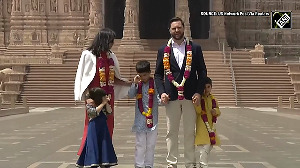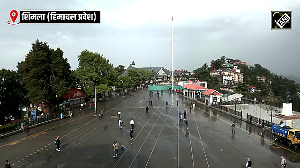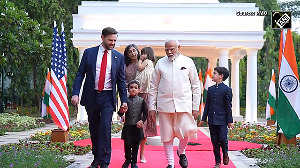Janata Dal (Secular) rebel leader H D Kumaraswamy was on Friday sworn in as Karnataka's 18th chief minister.
Senior Bharatiya Janata Party leader B S Yediyurappa took the oath as deputy chief minister.
Governor T N Chaturvedi administered the oath of office and secrecy at Vidhana Soudha, the state secretariat, in Bangalore.
Complete Coverage: A Coalition's Fall
Both Kumaraswamy and Yediyurappa took the oath of office in Kannada.
Prominent among those who were present on the occasion were senior BJP leader M Venkaiah Naidu and BJP national President Rajnath Singh, who flew in to witness the BJP assuming power for the first time in South, making Karnataka as its gateway to the region.
Former Prime Minister H D Deve Gowda, who had vehemently opposed his son and his followers joining hands with the BJP to form the government, was conspicuous by his absence.
The decks for the new government were cleared on Thursday when Karnataka High Court refused to stay the swearing-in ceremony on a petition that sought disqualification of Kumaraswamy and JD-S rebel legislators from the assembly membership on ground of defection.
The path to power for the new combination became much smoother after JD-S rebel legislators firmly told Gowda at a meeting with him on Thursday night that they were in no mood to change their course and instead sought his 'blessings' for the alliance with BJP.
A full-fledged ministry would be constituted after February eight, when Kumaraswamy will seek a vote of confidence to comply with the directive of the Governor to show that he commanded majority within eight days of assuming office.
Will the Karnataka Congress recover
The BJP and JD-S have struck an alliance on the pattern of Congress-National Conference government in Jammu and Kashmir.
Accordingly, Kumaraswamy will head the government for the first 20 months after which a BJP nominee will take over for the remaining term of 20 months.
Under the agreement, the BJP will have 18 ministers, including Yediyurappa, while the JD-S will have 16, including the chief minister.
The BJP, which emerged as the single largest party after the 2004 elections with 79 seats, had taken the main opposition slot following the Congress, which could muster only 64 seats, and the JD-S (59 seats) forming the coalition with N Dharam Singh as the chief minister.
However, a large section of JD-S legislators on January 18 marched to the Raj Bhavan and submitted letters, individually, to the Governor, stating that they had elected Kumaraswamy as their leader and that they will form a government under his leadership in alliance with the BJP.
The BJP members also gave a similar letter to Chaturvedi the next day. Taking note of the sudden political developments, Chaturvedi asked Dharam Singh to prove his majority on the floor of the House on January 27. However, the House witnessed pandemonium and was abruptly adjourned sine die by the Speaker.
While the Speaker accused Dharam Singh of failing to move the motion on the Trust vote even after being asked to do so thrice, the latter argued that he could not move the motion as the House was not in order.
However, Dharam Singh tendered his resignation the next day and the Governor called Kumaraswamy to form a government and prove his majority within ten days after assuming office.







 © 2025
© 2025